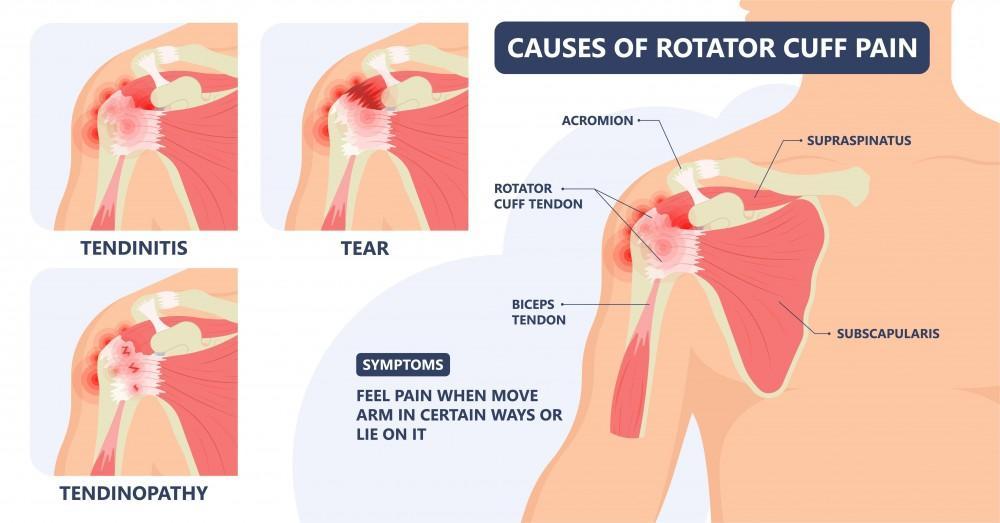Health
How to tell if you have a torn rotator cuff: Symptoms and diagnosis

A torn rotator cuff is a common injury, especially among athletes and individuals who engage in repetitive shoulder activities. Recognizing the signs and symptoms of a torn rotator cuff early can lead to prompt treatment and better health outcomes. This article explores how to tell if you have a torn rotator cuff, detailing the symptoms, causes, diagnostic methods, and treatment options.
Understanding the rotator cuff
Below you will find out some facts about the rotator cuff.
What is the rotator cuff?
The rotator cuff is a group of four muscles and their associated tendons that stabilize the shoulder joint and allow for a wide range of shoulder movements. These muscles are:
- Supraspinatus
- Infraspinatus
- Teres minor
- Subscapularis
Functions of the rotator cuff
The rotator cuff is essential for:
- Stabilizing the shoulder joint
- Allowing arm rotation and lifting
- Maintaining shoulder strength and flexibility
How to tell if you have a torn rotator cuff?
Recognizing the symptoms of a torn rotator cuff is crucial for seeking timely medical attention. Common symptoms include:
- Shoulder pain: Persistent pain in the shoulder, especially when lifting the arm or performing overhead activities.
- Weakness: A noticeable decrease in shoulder strength, making it difficult to lift objects or perform daily tasks.
- Limited range of motion: Difficulty moving the shoulder through its full range of motion.
- Crackling sensation: A crackling or popping sensation when moving the shoulder.
Pain characteristics
The pain associated with a torn rotator cuff can vary:
- Location: Pain is typically localized on the front and side of the shoulder.
- Intensity: It can range from a dull ache to sharp, severe pain.
- Timing: Pain may worsen at night or when lying on the affected shoulder.
Causes and risk factors
A torn rotator cuff can result from:
- Acute injury: A sudden, traumatic event such as a fall or lifting something heavy.
- Repetitive motion: Overuse of repetitive activities, such as throwing, swimming, or painting.
- Degeneration: Age-related wear and tear that weakens the tendons over time.
Risk factors
Several factors can increase the risk of a torn rotator cuff:
- Age: Individuals over 40 are more prone to degenerative tears.
- Occupation: Jobs that require repetitive shoulder movements or heavy lifting.
- Sports: Activities that involve repetitive arm motions, such as baseball, tennis, and swimming.
- Family History: A genetic predisposition to shoulder injuries.
Diagnostic methods
A healthcare provider will perform a thorough physical examination to assess the shoulder. This may include:
- Range of motion tests: Checking the shoulder’s ability to move in different directions.
- Strength Tests: Evaluating the strength of the shoulder muscles.
- Palpation: Feeling for tenderness or deformities around the shoulder joint.
Imaging studies
Imaging studies are crucial for confirming the diagnosis of a torn rotator cuff:
- X-rays: While X-rays do not show soft tissues like tendons, they can rule out other conditions such as fractures or arthritis.
- Magnetic resonance imaging (MRI): An MRI provides detailed images of the rotator cuff muscles and tendons, helping to identify tears and their severity.
- Ultrasound: An ultrasound can visualize the rotator cuff in real-time, allowing for a dynamic assessment of the shoulder.
Special tests
Specific physical tests may be conducted to pinpoint the location and extent of the injury:
- Neer’s test: To check for shoulder impingement.
- Hawkins-Kennedy Test: Another test for shoulder impingement.
- Empty can test: To assess the supraspinatus muscle’s integrity.
- Lift-off test: To evaluate the subscapularis muscle.
Treatment options
Many cases of a torn rotator cuff can be managed with conservative treatments:
- Rest: Avoiding activities that exacerbate the pain.
- Ice and heat therapy: Applying ice to reduce inflammation and heat to relax muscles.
- Physical therapy: Exercises to strengthen the shoulder muscles and improve flexibility.
- Medications: Over-the-counter pain relievers such as ibuprofen or acetaminophen.
Surgical treatments
In severe cases, surgical intervention may be necessary:
- Arthroscopic surgery: A minimally invasive procedure to repair the torn tendon.
- Open surgery: In more complex cases, open surgery may be required to reattach the tendon to the bone.
- Shoulder replacement: In cases of significant joint damage, a shoulder replacement may be considered.
Recovery and rehabilitation
How to heal from rotator cuff surgery involves:
- Immobilization: Wearing a sling to keep the shoulder immobile during the initial healing phase.
- Physical therapy: Gradual rehabilitation exercises to restore strength and range of motion.
- Follow-up care: Regular check-ups with the surgeon to monitor progress and address any complications.
Long-term management
Managing a torn rotator cuff in the long term includes:
- Continued exercise: Maintaining a routine of shoulder-strengthening exercises.
- Avoiding re-injury: Modifying activities to prevent strain on the shoulder.
- Regular monitoring: Periodic assessments with a healthcare provider to ensure the shoulder remains healthy.
How to tell if you have a torn rotator cuff? Next steps
Knowing how to tell if you have a torn rotator cuff is essential for seeking appropriate treatment and ensuring a full recovery. Recognizing the symptoms, understanding the causes, and undergoing proper diagnostic evaluations can lead to effective management of this common shoulder injury.
Whether through conservative methods or surgical intervention, addressing a torn rotator cuff promptly can help restore function and alleviate pain, allowing individuals to return to their daily activities with confidence. Also, here are some similar articles that you might find useful:
